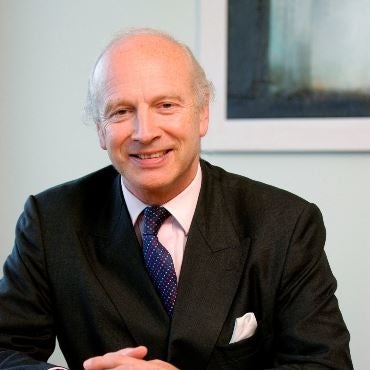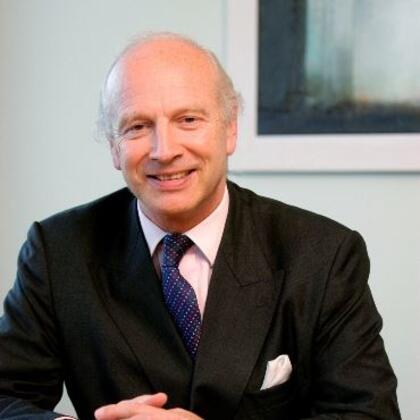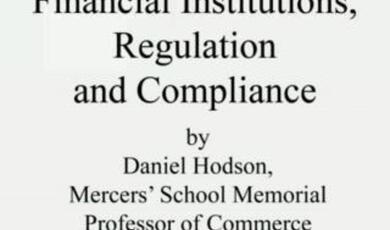Governance and the City
Share
- Details
- Text
- Audio
- Downloads
- Extra Reading
Is City governance effective and how ought it to be reformed? Does it represent a competative advantage or a competative burden? The relevant importance and future roles of the Lord Mayor, the City Corporation, the Financial Services Authority, the Bank of England, the Treasury and the various other representative bodies. Is there a need for a shared strategy and/or any central institution to represent or communicate on behalf of the City?
Download Text
Governance and the City
Professor Daniel Hodson
This time last year I lectured on various aspects of the governance structure of the City, and its leadership in particular. Tonight I wish to return to the same overall theme, but focussing rather on four specific elements of governance: the distribution of power and decision making; the generation of vision and strategy; the leadership that accompanies them; and their communication. I shall look at aspects of the future and how events taking place today may affect, assist and perhaps threaten the City in its extraordinary position in the British, European and global economy.
The Six Estates
The governance structure of the City is like the British Constitution - unwritten, but, sadly perhaps, without a Bagehot to put a logical framework round it. There are in effect six major groupings - I shall call them Estates - who have a profound impact on the way in which the City functions, with different weightings and influence depending on the matter in hand, and with a skein of interrelationships creating checks and balances. It is the very flexibility of this structure, the lack of an overall plan and explicit, focussed leadership which many believe has served the City well. It has provided durability where the City's overseas competitors have used a harder, less flexible dirigiste, approach to planning and leadership, which has not been quick to respond, as the City as whole undoubtedly has been able, to the inevitable changes in the political, economic, technological and market environment. Decision making in the City has in effect been led by a myriad of microeconomic decisions rather than high level and potentially brittle top down pronouncements.
But I believe this to be potentially unstable - indeed illusory - equilibrium. Much attention has been recently drawn to the fate of the British Empire which was seemingly at the zenith of its power in 1900 and would last for ever, but was in fact already experiencing the internal weaknesses which would destroy it within a few decades. Is the City in the same position? I shall show how potential changes in the structure and approach of all but one of these Estates could seriously damage and vastly reduce the power and competitive position of the City of London.
The City Corporation
The local government body is of course the Corporation of London, and at its head a form of constitutional monarch known as the Lord Mayor. His power is not only curtailed by the limits of his position, but also on account of his short - one year - tenure; the latter putting one in mind of the Doge of Venice who was usually deliberately elderly when elected to ensure that 'the natural solution' as De Gaulle called it would sweep him away before he became too powerful.
But, like a constitutional monarch the Lord Mayor has an important hierarchical and ceremonial role. However the political power resides with the elected element of the Corporation, and specifically with Common Council, the 130 (soon to be reduced to 100 as I shall describe later), each representing one of 25 City wards. The political leader of the City is the Chairman of the Policy and Resources Committee of the Council, Judith Mayhew, and she is given to describing the relative responsibilities of her and the Lord Mayor, perhaps a trifle counter intuitively, as: 'I am the Prime Minister and he is The Queen.' The role has crept increasingly into the public eye in the last decade, and the holder, particularly with the legitimacy of elected status, and the support of the Common Council, is inevitably seen as providing key leadership in City affairs - and well beyond the expectations of a local authority council leader. For instance my guest had a crucial hand in the long drawn out and ultimately successful struggle to prevent an European withholding tax on interest bearing securities.
The franchise reforms and possible consequences Changes are afoot with City democracy, a subject of some political focus in recent times, not least as the current legislation goes through Parliament, in effect reforming the City franchise. Currently elections to Common Council give votes to some 35,000 individuals who live in the City, and also to non incorporated partnerships, the latter being hardly representative of the vast mass of incorporated bodies who do the business of the City. This lopsided arrangement is reminiscent of the famous rotten boroughs (in the City's case, wards) which were swept away by the two mighty Reform Bills of the 19th century. It is however to be changed, retaining the individual ballot, but allocating votes not only to partnerships but also to every other enterprise with offices in the City, on a formula relating to the rateable value of the City premises occupied. Clearly the new arrangements are designed to give a voice to the businesses that make up the fabric of City life, and also to those that work within the City. The irony is however that, while these votes will be exercised by identified employees nominated by the relevant enterprises, there is no way that the individual voters can be bound by their employers; they will have an absolute right, in a secret ballot, to vote any way they wish, and certainly, if they feel so inclined, against the interests of their employer. Furthermore, and crucially, the legislation will proscribe that the employee nominees should 'reflect the composition of the workforce of the appointing organisation' creating the prospect of a college of voters of widely varying political views.
The result is that while these reforms give the impression of an ingenious and effective method of extending the franchise to business, in reality they could be said to do no more than extending it to a nominated group of individuals who happen to work in the City. In addition it is estimated that business nominees will total only 20,000 to 35,000 existing individual voters, so that they will in any event remain in the minority. And so reform only goes part of the intended way. The businesses who control the City markets and activities continue to have no direct say in the franchise, since they cannot bind their nominees, although many would argue that they will have a strong influence, insofar as most people are, when it comes to voting, prisoners of their own environment, and would regard voting as their employers might wish as in their own best interests.
However, as with all constitutional changes, the true effects will not be known for a little while, but it is a racing certainty that they may be somewhat different from that intended by their architects. I say that without malice aforethought, but based on unfailing historical observation: Tony Blair's reform of the House of Lords has produced a half baked chamber which he does not control but with far greater moral standing and thus real power than its predecessor, whilst devolution in Scotland and Wales appears to have weakened rather than strengthened the Union. 134 years ago Disraeli caught the Whigs bathing with his 1867 Reform Bill but lost the next election as a result of the votes of the people he had just enfranchised. Perhaps a side lesson is that the beneficiaries of reform are an ungrateful lot.
These reforms come at a time when there may be an increasing politicisation of Common Council. It is only quite recently that the majority of County Councillors have ceased to be independents; many people mourn the more consensus less overtly party political driven debates of those days, but the fact is that without a major party tag it is very difficult to be elected to a local government entity at any level. Members of Common Council have traditionally had no political ties, indeed have probably been relatively homogeneously in the Conservative or perhaps Liberal/LibDem interest, but rarely Labour supporters, except perhaps very much in the closet. However the re-emergence of the centre ground in politics, in the context of the rise of New Labour, has meant that views of all political stripes are now more openly expressed within the City, when previously one tended to hear only opinions that veered to the right. Furthermore the reformed franchise may bring voters with a richer spectrum of political opinions, particularly as those voters must reflect the employee makeup of each business. The inevitable consequence must be that sooner or later members of Common Council will be elected with known political affiliations which reflect the national party lines.
Thus, whilst one predictable effect of reform may be that those whom it hoped to enfranchise will not in fact have the electoral power intended, a further, and dare I say also unintended effect, may be to break the current political consensus and create a Court of Common Council whose debates and voting patterns more resemble those of a normal local government chamber, reflecting the ideological and political views of the relevant national party. Put another way, political control of the City will potentially become almost as great a prize as political control of Greater London.
The Treasury and the National Government
This leads naturally to the second Estate, providing in theory at least overarching political influence on City affairs, namely that of National Government, and specifically The Treasury, and the ministers associated with it, led of course by the Chancellor of the Exchequer. There is a realisation that the City is the jewel of the economy and thus of huge importance to the political life of the nation, not least because of its employment of nearly 500,000 people many of whom live in marginal constituencies, and there are a series of formal and informal links at most top levels. It is hard to believe this combined with increased politicisation will not inevitably lead to more interference in the City's affairs by the National Government, unbalancing the current delicate structure.
The Bank of England
In this context a key political power is that of appointment, and none will be more jealously guarded by an interested National Government than the office of Governor of the Bank of England and Chairman of the Financial Services Authority (FSA), these institutions representing respectively the third and fourth Estates in City governance. The Bank of England, despite the loss of its regulatory status and the passing of the days when a twitch of the Old Lady of Threadneedle Street's eyebrow could send markets into turmoil, commands huge influence, mainly, by its own choice, covertly. If anything the overwhelming and natural public interest in the decisions of its Monetary Policy Committee (MPC) has increased its importance, and for three good reasons: the central importance of interest rates in economic management, the declared and deliberate independence of the MPC, and the perceived success - so far at least - of the current structure. The Bank, at least under the current Governor, has a preference for non intervention, at any rate publicly, but its intelligence gathering structure within all aspects of City affairs, its private involvement in the key issues of the day, and the respect with which it is held at home and abroad, in the media and behind closed doors, place it very much at the centre of City governance.
But the Euro may be shortly adopted by the UK and this would of course substantially reduce the power and influence of the Bank, losing as it would its central interest rate setting role. How much of its moral and actual authority would remain in these circumstances, and would this too affect the current governance structure within the City?
The Financial Services Authority
A similar European initiative may also affect the fourth Estate, the FSA. On the one hand, it is often asserted, and I believe correctly, that the quality and depth of the British regulatory system, and certainly so far as wholesale markets are concerned, is an Unique Selling Proposition (USP) for the City. It must be considered some kind of triumph of the flexibility and common sense of those involved, successive governments, market leaders, and formal City institutions, that the progress towards this situation, a journey that realistically has only taken some 15 years and is still being to a degree experienced, has reached this benign position. The latest evolution of the regulatory framework of the financial services industry and of the City in particular, the Financial Services Authority, and its powerful Chairman, sits alongside the City's formal political structure and within sight of the watchful eye of the Bank of England. However at my last lecture the vision of a European super-regulator was raised as more probable than possible. Such an entity could well emasculate the FSA, and remove a powerful USP for the City, as perhaps some of its continental proponents would intend. This combined with the reduced power of the Bank could also create a power vacuum which a politicised Corporation and an increasingly interfering Government may wish to exploit.
Other powerful institutions
I turn now to the less well known and more secretive, but nonetheless powerful fifth and sixth Estates. It is not at first obvious that there are a large number of influential bodies, some with formal constitutions, which, sometimes by themselves but usually in appropriate combinations, play a key role in governance - the fifth Estate. At the most public end come the exchanges, although their influence will wane as they progress from member owned, cooperative City icons to fully fledged widely held plcs, no more no less than any other service provider; in their bracket I include their necessary concomitant, The London Clearing House, which for reasons which I have set out in an earlier lecture, will undoubtedly continue to occupy a role of great economic importance to the City of London. Also occupying the public arena by virtue of their function come the soon-to-be renamed British Invisibles and the Takeover Panel, and the various trade bodies, such as the British Bankers Association (BBA), the London Investment Bankers Association (LIBA), and the Association of British Insurers (ABI). And behind them come a number of less public institutions, the livery companies and informal 'clubs' and committees formed out of the mutual self interest of their members which opine lobby and influence in the context shared issues. Leadership is harder to pin down here, vesting as often does in the character of an office holder, and the perceived importance of the institution. For instance Sir Nicholas Goodison when Chairman of the Stock Exchange was seen as a pre-eminent City leader and could speak with pan-City authority, in a way that none of his successors have been able to or sought to emulate. Equally the character and track record of Lord Levene - a previous Lord Mayor of course and used to the limelight - would indicate that British Invisibles will move into public centre stage, of which more anon. But each of these units in their own way play a role in City governance, and will continue to do so whatever other changes occur.
Key overseas decision makers
I come now to the final and perhaps most controversial of the estates, and one which is an inevitable consequence of the Wimbledonisation of the City ('we make the rules, they play here'). The conventional argument of the last few years has been that it does not matter who owns the players nor where the markets are, since global electronic distribution means that they can always 'virtually' be in London - the latter being a matter of considerable frustration for instance to the good burghers of Frankfurt with the rise and rise of Deutsche Borse/Eurex, with the people if not the business staying in London. The important thing is that the traders, the investment managers, the key decision makers can and do remain here. And of course the current advocates of their interest in the City are the various bodies, local to London which make up the fifth estate which I have previously described.
But several facts illustrate now this is changing: the ever increasing foreign ownership of formerly British key City institutions, so that in so many markets - investment banking in particular - important British players are rarely to be seen; the natural desire for cost and control reasons to put key decision makers in one global headquarters, not necessarily in London; the trend towards global and virtually stateless humungous financial conglomerates with important bases in the City, and therefore with a natural desire to safeguard their current and future profitability by taking a keen interest in the political, governance and economic environment in which they operate.
It seems inevitable that these key decision makers, either directly or through their agents, will seek an increasing say in City affairs. How might this occur? Without a doubt it will be through their increased understanding of the complexities of power and governance in the City, and in particular through their abilities to manipulate and lobby the five other Estates. Firms and individuals used to the subtleties of Capitol Hill will not be put off by comparable complexities in the City when their vital interests are at stake. They will be attempting to pull levers in the Corporation, the Bank, the FSA, the Treasury, and amongst the various official and informal bodies who exist in the City, and they will exploit and tend to exacerbate the potential changes in the balance of power between the other Estates. In return, as such overseas people and institutions emerge as key players who hold power over massive City resources, their views and requirements will increasingly tend to be front of mind for the policies and decisions of each estate. A principal concern will become the welfare and benevolence of parties overseas, whose interests may not at all coincide with those either of the British participants in the City or indeed the British economy. The City may, quite apart from any other changes occurring, be increasingly dancing to tunes played in New York, Paris and Frankfurt by powers resident in those Cities. They are indeed the Sixth Estate. Strategy and Leadership
Does the potential need to cope with such major alterations of power and attitude expose a weakness in the loose limbed nature of City governance - despite its success to date? Historically such governance structures have worked as long as all participants faced more or less in the same direction, but have failed in the face of radical change, as has for instance the cooperative movement. Does it emphasise as never before the need for a clear and articulated strategy and the recognised leadership to take responsibility for and to implement it? In respect of the latter the City Establishment has many distinguished people with significant power, a high profile and leadership qualities, but there is no single leader or leadership group and certainly no clear communicated vision and strategy, whatever may be in the collective minds of such people and the interests they represent. In fact of the two obvious contenders, the Bank of England and specifically its Governor - in poll position perhaps - have chosen, certainly in the case of the current incumbent, to take a non-interventionist approach, at any rate in public, on issues outside the direct responsibility of a Central Monetary Authority; taking the view that the interests of the City are best served by those mysterious and very British techniques of the 'due processes of consultation' and trading on the Bank's private but immense web of contacts and information which permeates all paspects of City life. But the Governor is a political appointee, and the Bank has a duty of independence and a tradition of aloofness; in any event his and its position will be weaker should the Euro replace the pound sterling. This is a deliberate reticence, whereas the Policy and Resources Committee and its Chairman have different constraints.
The current holder of the latter office has, in my mind very properly, interested herself in many aspects of the City, some privately and behind closed doors, but many publicly, and some would argue well beyond her role as the senior political figure in the Square Mile. But it is her role as a politician, and a reforming one at that, that possibly restrains her from taking a more full blooded central position of leadership, in the way that the directly elected Ken Livingstone has been able to do for London as a whole. She has to look behind her at the serried - and perhaps jealous - ranks of Common Council to ensure that she enjoys sufficient support to go as far she does. And how would her role and that of her Committee be changed by the increasing politicisation of the City? In the end it is the very political nature of responsibility for the future, and its fundamental interests in the fabric and success of the City, as well as the huge resources available to it that it, and to its political leadership, that make the Corporation of London the obvious standard bearer for a more ordered vision and the strategy that follows from it. Clearly much thought and effort has and continues to go into this activity behind closed doors within the Corporation, but I believe that the time has come for even more assertive leadership in the face of radical and potentially damaging change. My own view is therefore that Judith Mayhew and her committee with the resources of the Corporation behind them should become the central figures in this activity. Whilst I believe that internal politicisation and external political interference will make this increasingly difficult, such changes will be comparatively slow to occur, and, given the natural time lag, the scenario and strategic planning that are in my mind necessary must be accomplished now. Communications
There is another factor at play here. From the politics of New Labour at one extreme to the war of words that accompany contested takeover bids at another, it is clear that successful communications are a key element in the execution of strategy; what is gained on the ground, may be lost, and quickly so, in the media. Is there a need for a single, consistent, reliable communications unit, well plugged in to City affairs, enjoying the confidence of the leaders of each Estate, with an understanding of the strategic themes, aims and objectives, in so far as they are able to be articulated - and using the most modern techniques and the widest range of media contacts to get them across? Such an entity, commanding media and public respect, would also be critical not just in playing off the front foot, but also in responding to crises affecting the City as they occur, as inevitably they will. In last year's lecture I posed the example of the Barings crisis where with hindsight the principal culprits were the appalling internal governance of the bank itself, and the total failure as a frontline regulator of the SIMEX exchange in Singapore. Yet the spin on the story was, and probably in many people's minds continues to be a failure of London regulation and a massive blow to London's reputation for financial acumen.
The FSA predecessor, the SIB, was somehow twisted into publicly calling itself 'incompetent'. Was there ever a more crying need for one entity to pull together the communications efforts of all interested parties within the Estates of the City, and to ensure that the right balance and depth was achieved. My hesitant answer at that time was that British Invisibles, supported financially, morally and at board level by all the principal players in the City was probably in poll position to take on such a role. I would continue to support this proposal, particularly as we await the results of the review being undertaken by the incoming Chairman, Lord Levene, himself a veteran of the communication scene. The timing of and the momentum behind this review will be provide a one off opportunity.
returning to my previous remarks on strategy and leadership, it may even be that such a defined and recognised central role for a rebranded BI, under a strong, farsighted and determined Chairman, may start to increase the pressure for a more coherent and articulated vision for the City, the need to draw up the strategy more formally - always allowing for flexibility - and to provide at least a series of roadmaps as part of that strategy, and for there to be a means by which this might be achieved, as well as defined leadership to ensure that these means are used and the objectives attained. Conclusions
A good point at which to throw the debate open.
My various point once more:
The City has been well served to date by the flexibility and informality of the interrelationship of the six Estates that hold power and provide an input to governance within it: the Corporation of London, the National Government, the Bank of England, the Financial Services Authority, a large group of other powerful formal and informal institutions within it, and key overseas decision makers Lack of clearly articulated vision and strategy, as well as the leadership and communications to see them through could be dangerous for the City in the light of future changes in most Estates The reformed franchise may make the affairs of the Corporation of London increasingly politicised Given this and the vital economic role played by the City in the nation's affairs, National Government may increasingly interfere in the political and business activities of the City The position of both the Bank of England and the Financial Services Authority may be substantially weakened by European events: the Bank because of Britain's adoption of the Euro, and the FSA because many of its powers may in due course be replaced by a Europe wide super-regulator Key overseas decision makers may in order to protect important interests become directly involved in City affairs and the Estates may also increasingly deal directly with them Given the alternatives, the necessary strategic framework, and the central leadership to accompany it, could become the responsibility of the Corporation and specifically its political leader, the Chairman of the Policy and Resources Committee. A reinvigorated and rebranded British Invisibles could become the accepted communications arm of the City.
© Professor Daniel Hodson
This event was on Mon, 14 Feb 2000
Support Gresham
Gresham College has offered an outstanding education to the public free of charge for over 400 years. Today, Gresham College plays an important role in fostering a love of learning and a greater understanding of ourselves and the world around us. Your donation will help to widen our reach and to broaden our audience, allowing more people to benefit from a high-quality education from some of the brightest minds.


 Login
Login







